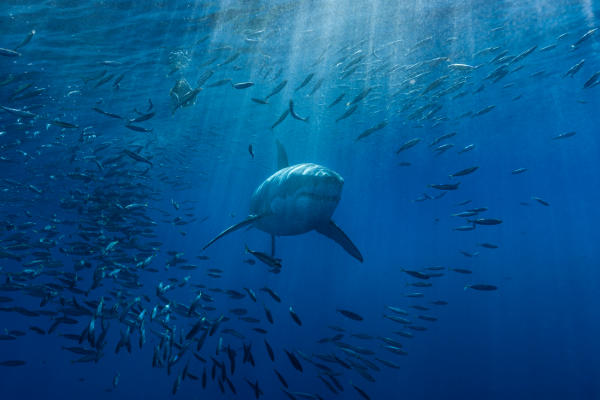Sharks have been around since the dinosaurs
Carcharodon megalodon, the largest shark ever to have lived (Between 16 and 1.6 million years ago), is a close relative of the great white. Fossil evidence suggests it grew to a length of 16m, had jaws that were more than 2m wide and had teeth as long as 21cm!
It’s likely that a large megalodon weighed more than 25 tonnes. In comparison, the great white grows to 6 metres, weighs up to 3 tonnes and teeth 5cm long.
Sharks come in lots of shapes and sizes
While we often think of all sharks as being big and bitey, there's hundreds of different species of sharks which come in all kinds of sizes. The tiny deep-sea dwarf lanternshark reaches a maximum length of 21.2cm – about the length of your average iPad! Meanwhile, the giant filter-feeding whale shark – which mainly eats plankton – can reach a bus-sized 14m.
They don't naturally hunt humans
While sharks do attack humans occasionally, they don't actively try to hunt us. In fact, usually they bite us because they think we're a seal or turtle, and have no hands to touch us to find out!
Your risk of being attacked by a shark isn't rising
One of the great factors of living in Australia is the ocean environment. Whether as a beachgoer, surfer, diver or fisher – when we enter the ocean we enter an environment that is inhabited by other animals, which means there's always some risk.
There's no evidence of increasing shark numbers that would mean the rise of attacks in Australian waters. The increase in shark attacks over the past 20 years is consistent with international statistics of shark attacks increasing annually, but this is simply because there are more people swimming in oceans than ever before.
Sharks don't just live in the ocean
While we often think of sharks as being a saltwater species, they can be found in estuaries (where the river and ocean water mix) too. Some sharks even live in large freshwater rivers, like the bull shark.
You've probably eaten shark before
Have you had dinner from your local fish and chip shop recently? Chances are, you were served shark!
In Victoria, shark is commonly served as the standard fish at many fish and chip shops across the state under the name 'flake'.
They're quite slow most of the time
Aside from when they're attacking their prey, sharks tend to swim around 3-4 kilometres per hour. It's thought that their tail shape isn't designed for speed, but to help push them towards the ocean floor as they hunt.
The fastest shark is the shortfin mako, which can reach speeds of 13.8 metres per second. This makes them faster than olympic runner Usain Bolt, but slower than a horse.
Sharks lose their teeth
All shark species constantly shed and replace their teeth. Some lose up to 35,000 in a lifetime.
Sharks don't have bones
Crazy, but true! Sharks belong to a class of fish called Chondrichthyes, which have skeletons made up of cartilage (like your ears) rather than bone.
They're rumoured to like AC/DC!
We're not kidding. Matt Waller, a shark tour operator in South Australia's Neptune Bay, has observed that when sharks heard the band's hits Shook Me All Night Long and Back in Black, they're drawn to the source of the music.
Maybe avoid those tunes at the beach!

